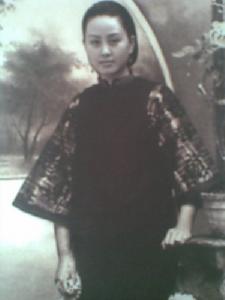Qiu Jin: A heroine in China's anti-feudalist cause
 0 Comment(s)
0 Comment(s) Print
Print E-mail
China.org.cn, September 18, 2011
E-mail
China.org.cn, September 18, 2011
|
Qiu Jin.[File photo] |
Nicknamed the Female Knight of Mirror Lake, Qiu Jin, (秋瑾 November 8, 1875-July 15, 1907) was an early feminist, revolutionist and poet in the late Qing Dynasty (1644-1911). Advocating equality between men and women and promoting western democracies, Qiu was beheaded after a failed uprising and is considered a heroine in China's anti-feudalist cause.
Born to a moderately wealthy family rooted in Shanyin, Zhejiang Province, Qiu grew up with interest in reading, horseback riding and sword performing. Seeing her unique interests, her family provided her with a good education and expected her to integrate in a gentrified society. At the age of 21, she married into a rich family at her father's arrangement. Approximately four years after the marriage, Qiu's husband was promoted to be an official in the imperial court in Beijing. However, living with a man, who harbored a more conventional outlook than she did, Qiu soon got tired of their mundane relationship and went to Japan in 1904 to study.
Noticed for her masculine style of dress and her revolutionary thoughts, she became acquainted with many revolutionists and joined relevant societies, including, Guangfuhui led by Cai Yuanpei and Tongmenghui led by Sun Yat-sen. She returned to China in 1905.
After receiving a sum of money from her husband's family, Qiu established a woman's magazine in 1907, advocating women's liberation, including financial independence, freedom in marriage, education and professions as well as the abolishment of the practice of binding feet, an aberrant tradition which crippled women's feet to create a body figure and shape walking gestures that were appreciated by men.
Influenced by western democracy, Qiu was determined to overthrow the corrupt Qing Government ruled by Manchu royal family. She worked with her cousin Hsu Hsi-lin in organizing and uniting secret societies, camouflaged by a school for girls. On July 6, 1907, Hsu was caught by Qing troops before a scheduled uprising and confessed his involvement after interrogation. On July 13, Qiu was arrested at the school where she was the principal. Although, she denied her involvement, the government found incriminating evidence and executed her in Shaoxing, Zhejiang Province. It was said her life might have been saved only if she made a confession letter. But she refused and just wrote a line of poetry: The autumn wind and autumn rain agonize me so much. She was buried by a friend at the bank of West Lake in Hangzhou.







Go to Forum >>0 Comment(s)